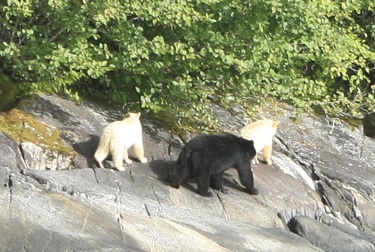In his signature modernist poem The Waste Land, T.S. Eliot famously wrote that "April is the cruelest month." For large carnivores in British Columbia's Great Bear Rainforest it unquestionably is, for it marks the start of the spring recreational hunting season. After a long tough winter, many grizzlies, black bears, wolves and cougars are girding themselves for the onslaught of "sportsmen" wielding high-powered rifles in search of "trophies." For these top predators, April signals a time to start dodging bullets from the ultimate super predator -- Homo sapiens.
For tomorrow's children to see wild bears, wolves and cougars in coastal BC, bold new conservation efforts are required. Coastal bears, in particular, face numerous threats to their survival, including habitat loss, a declining supply of salmon and trophy hunting. Although some progress has been made on protecting bear habitat, declines in salmon populations are potentially reducing the number of new cubs -- which would have the result of ultimately lowering future bear numbers. Moreover, the threat from trophy hunting continues in the Great Bear Rainforest, even in the new protected areas. This is more than just an ecological issue; it's also an ethical one. Hunting these magnificent animals for entertainment and profit is simply wrong. Additionally, comparative economic analysis has shown that bear-viewing generates approximately twice the annual revenue as the grizzly hunt.
With both the ruling BC provincial government and official opposition unwilling to end the trophy hunt in the Great Bear Rainforest, despite public sentiment to the contrary, thinking out of the box has become a necessity. In an unprecedented move, Raincoast Conservation Foundation -- backed by our supporters -- purchased a 24,700 km² (9,537 mi²) hunting license in 2005. Securing the exclusive rights over this vast big game hunting territory, an area almost three times the size of Yellowstone National Park, instantly changed the landscape for large carnivores. Grizzlies, wolves, and black bears were no longer targets for commercial trophy hunters throughout a large portion of BC's central coast.
It has now been five years since our acquisition, and there are river valleys we have seen come alive with bears and wolves. The renewed presence of these animals has also helped spur commercial wildlife viewing and local business opportunities. Throughout our current guide outfitting territory, people armed only with cameras can now find grizzlies feeding on spring sedges or wolf pups playing in tidal mud flats. The success of this initiative has reinforced our long-term objective to acquire additional commercial hunting rights on the BC coast.

Photo courtesy of Kevin Smith.
In 2010, Raincoast began negotiations to acquire a hunting territory like no other -- the primary place in the world where the very rare spirit (a.k.a. Kermode) bears roam. Spirit bears are a white phase of the North American black bear. Despite a restriction on killing spirit bears, trophy hunting of black bears -- which carry the recessive gene that causes the white coat -- is allowed. Supported by Coastal First Nations and the Commercial Bear Viewing Association of British Columbia, our purchase will protect one of the rarest bears in the world and safeguard the genetically unique rainforest wolves we have studied for over a decade. The new 3,500 km² (1351 mi²) license lies next to our existing guide outfitting territory, providing important connectivity between these two areas. Last year, we negotiated an agreement to acquire this one of a kind hunting tenure and have been fundraising to secure the purchase price. We have until June 2011 to raise the balance of the funds.